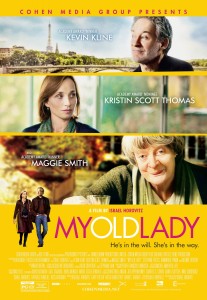I don’t consider my movie reviews to be the final word on any front. If anything, I’m your phone-a-friend lifeline. I may be dead wrong but I may also have the million dollar answer.
I am, however, hopeful that my write-ups will help others fine tune their own projects. For instance, playwright Israel Horovitz may read my review of his film My Old Lady and comprehend it as a negative opinion, but someone else, let’s say, playwright Lindsay Price could read it and use my criticism to direct a film adaptation of her Tuna Fish Eulogy. Although, Price is a hard shell to crack. But, again, I can be hopeful.
Horovitz’s My Old Lady follows a trend that these plays-turned-fims tend to fall in to. Horovitz is the author of the original play this film is based on, and has copied-and-pasted it to the screen. I haven’t seen his character driver play, but the movie isn’t far from the usual three act, minimalist stage show you could catch in Stratford, Ontario.
The play My Old Lady may improve on stage where the audience can maintain a connection with the hard workers performing for us, but Horovitz’s barebones staging of the drama is dull and has movie goers aching as we watch perfectly fine actors (Kevin Kline, Kristin Scott Thomas, Maggie Smith) try and make something out of the material.
I had the same dilemma with last year’s A Master Builder, a Jonathan Demme directed piece and written by Wallace Shawn adapting Henrik Ibsen’s play. Like My Old Lady, Demme had supurb performers but the final product was all wrong and boring to boot. Then again, Shawn made the task difficult by constructing a difficult screenplay.
With My Old Lady, Israel Horovitz is working with himself. Even though the film has a slew of producers, no one has told him that the film’s layout is dull. A moviegoing audience doesn’t need non-stop thrills to hold our attention, but we do need upbeat or inspired filmmaking. Horovitz may have had this thought itching his brain, but this lifeless movie leads me to think that the writer/director didn’t want to compromise his original vision. In order for this to work, however, he needed to take on this adaptation with an open mind. If he had, we may have gotten a palpable movie to digest and think about afterwards.
The skilled cast is trying their best, and Klein’s irked performance only makes us wonder what this adaptation would’ve been like under the direction of, let’s say, Dogville’s Lars von Trier or The Perks of Being a Wallflower’s Stephen Chbosky. Again, I may be dead wrong, but this could be the million dollar answer.





Be the first to comment